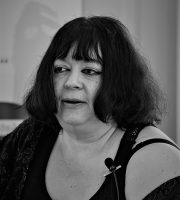by Diane Seuss
Now that the TV is gone and the music
has been hauled away,
it’s just me here, and the muffling silence
a spider wraps around a living morsel.
And at times, often, the unbearable.
I bear it, though, just like you.
Long ago, I bore a suitcase filled with books,
bore it far on city streets. To sell, I guess, at some
used-books place, one of those doorways down
steps into dankness and darkness. The scent
of mildewed, dog-eared, fingered pages.
The suitcase, big and square and sharp-cornered,
covered in snakeskin, bought at Goodwill
for a dollar, knowing I had some travelling to do,
some lugging, and I was right.
What books I sold I do not know.
Maybe that’s where “Modern Poetry” went.
The cover cherry-red and blossom-white.
I can see its spine in my mind’s eye,
pointing downward beneath the dank
and the dark to the water tunnelling
under the city and making its way to the river.
Poems sliding down the book’s spine
into water, the shock of the cold and dank,
down where my uterine lining, my blood
and cast-off ovulations, cast-off fetal
tissue swims, below the city.
The micro-dead ride modern poems
like swan boats in the park.
From the park to the river to the sea.
I’m thinking now of PJ Harvey and Nick Cave.
Balladeers. Lovers. Vita and Virginia.
Frank O’Hara and Vincent Warren. Somehow,
we ride our lost loves out to sea. Or they ride us.
It doesn’t matter. Poet or poem or reader, the same
ectoplasm. The modern, in time, becomes antique,
and the stone faces of the dead convert to symbols,
ripe for smashing. Come to think of it,
symbols are terrible. As the tyrant
shouted to the masses,
part of his brainwashing campaign:
I know it, and you know it, too.
I was twenty-three when I sold off
“Modern Poetry” and sailed to Italy, seeking
Romantic poetry, which was at one time
modern, and found my way to Rome,
and Keats’s death room.
His deathbed, a facsimile.
Everything he touched was burned,
to kill what killed him.
I lifted his death mask from its nail,
cradled it, closed my eyes and kissed his lips
until the plaster warmed,
and stained his face
with the lipstick on my lips. Red
as the cover of “Modern Poetry.”
The color of the droplets of arterial blood
he coughed onto his sheets, and viewed
by candlelight. Then he knew he was done for.
His death warrant, he called it.
After those many kisses over his face and eyes,
and the reticulated eyelashes,
cold and tangled,
my lips were blossom-white,
my face, chalked. Like I’d caught
something from him,
and I don’t just mean consumption,
though my lungs burned for years.
They still burn.
This is the danger of the ecstasy of kissing
the dead or dying poet on the mouth.
The disease you’ll catch—well,
it changes you.
The tingle in the spine,
the erotic charge, will be forever married
to poetry’s previous incarnations.
It’s why marriage itself never worked for me.
I kept wanting to get to the part
where death parts us
and I could find myself again.
Keats made such a compact corpse.
Only five feet tall, shorter than Prince,
and intricately made. Always,
he was working it, working it out,
the meaning of suffering, the world’s,
his own, the encounter with beauty,
nearly synonymous with suffering,
how empathy could extinguish him,
and he could set down the suitcase at last,
or finally deliver him to himself, distinct
as the waves in his hair and the bridge
of his nose. How auspicious,
rare, lush,
bizarre, kinky, transcendent,
romantic, to be young, just twenty-three,
and to cradle him
in my arms, as we listened
to the burbling water
of the Fontana della Barcaccia
from the open window.
Last updated March 11, 2023




